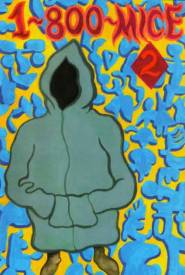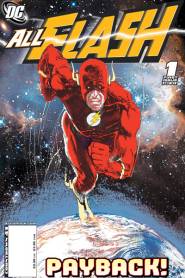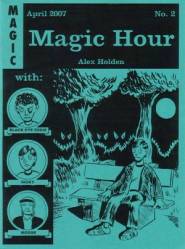 Home > CR Reviews
Home > CR Reviews Three Comics
posted July 19, 2007
Three Comics
posted July 19, 2007

 1-800-MICE #2
Creator:
1-800-MICE #2
Creator: Matthew Thurber
Publishing Information: Picturebox Inc., comic book, 24 pages, 2007, $3.95
Ordering Numbers:
I'll admit right up front I don't understand what the hell is going of here a lot of the time, nor am I always aware on what basis I should be deciding if
1-800-MICE is any good or not. Usually with comics like this, the second in a series from Matthew Thurber and PictureBox, I concentrate on the pleasure I get from the drawing and try to find some surface sympathy with the story. That's possible here. Although there are several short stories that seem self-contained, a longer narrative deals with the quest of three chefs hired by the Shogun of Los Angeles to retrieve and kill (not necessarily in that order) a rogue member of the Shogun's staff, his former assistant Peace Punk. Peace Punk distracts the trio by directing them to a secret concert where getting a ticket involves renting a crappy apartment and working a minimum wage job. I feel ridiculous even expending the energy to describe the plot, though, because the way I'm reading the latest issue seems to have more to do with picking it up and reading random panels to see if any look cool -- which they do; Thurber's an imaginative artist with chops to spare whose stuff in the bulk of the comic looks looks like either a) Jessica (formerly Jeff) Johnson making art from Mat Brinkman's visual bible, or b) Brad Johnson working with an editor that makes him redraw half his page -- and if they make me laugh.
They made me laugh. I'm semi-helpless before crude comics hi-jinx and inspired nonsense, particularly when the writing can go toe to toe with the art like Thurber's can. Here's a Thurber line, from a supplicant before some sort of king: "Acknowledged, sir, this odd-looking bitch upsetteth my wood pulp bucket spilling a day's worth of mandible toil." Mandible Toil! Here's another, from a teenager in a cab. "I spent way too much time on the Internet today. It's fucking up my DNA." Or a third. "... Things have been quiet at Colostomy Studios ever since a firecracker blew out my eardrums on the Chinese New Year." Who the hell talks like that? Who the hell thinks like that? Why would I possibly desire to pay greater attention to this stuff and potentially ruin my enjoyment of looking at it sideways from 100 yards across the room? Enough reviewing already.
 All-Flash #1
Creators:
All-Flash #1
Creators: Mark Waid, Karl Kerschl, Ian Churchill, Manuel Garcie, Joe Bennett, Daniel Acuna, Joshua Middleton, Bill Sienkiewicz
Publishing Information: DC Comics, comic book, 32 pages, July 2007, $2.99
Ordering Numbers:
If the end of the last
Flash series felt like a car wreck, than the first issue of the new series reminds me of a stop and walk through a mostly uninteresting roadside attraction.
All Flash #1, and by the clunkiness of the title I suppose they're all out of Flash-related names now, reads like the kind of comic I must have read 8000 of between my childhood on the couch and my mid-20s in Seattle reading the DC box: a solidly crafted distraction from the outside world that works as unsophisticated action-adventure but also comments in some small way on the general heroism, decency and all-around humanity of its main character. It probably says something not very nice about mainstream comics right now that meeting aims this modest feels like a towering achievement.
The story by veteran hand Mark Waid marks the return of the Wally West Flash, whom I assume is more popular than the Bart Allen Flash whose death at the hands of a gaggle of super-villains drove the last series finale and fuels this debut. There's kind of a sturdy charm to the book. The action is clear, the motivations aren't too difficult to grasp on a first read, and the situation that presents itself seems to connect just enough with real life to provide a basis as to what's going on and why. It feels like one of those TV series where James Brooks or Joss Whedon returns to one of their babies and writes or directs an episode after a particularly troubled later-season run. While the comic is still gunked up with enough plot detritus to fill a personalized museum, Waid is enough of a pro to emphasize and stress things that ground the reader in the essential fantasy of decency and effectiveness that drives many superheroes over the long-term.
Where the comic gets a little strange is that Flash penalizes Bart Allen's killer not by taking him to jail or even losing his cool and hurting the villain but by thinking it through and then sentencing him to eternal torture of a kind far more demented than anything I've seen in a comic since the 1940s, when such moments were played as arch and fantastic. In fact, being frozen into place while one's mind still works is one of the classic nightmares, and it's a bit disturbing that this gets presented to the readers as a kind of "you asked for it" twist. I haven't witnessed a fate this blithely ugly in a mainstream comic book since the semi-famous Ms. Marvel mind control and rape scenario years ago in an
Avengers, and the WTF quality of that particular maneuver was corrected relatively quickly and redirected for dramatic effect. I hope that's the case here. In fact, I hope it becomes a part of a future storyline, because if DC takes seriously the veneer of dramatic realism in which its modern comics trade, you can't have good guys torturing bad guys. Another, odder reason surfaces to hope the situation is further explored: it's just about the only thing of interest I took away from my reading.
 Magic Hour #2
Creator:
Magic Hour #2
Creator: Alex Holden
Publishing Information: Self-Published, mini-comic, 16 pages, April 2007, $2.00
Ordering Numbers:
The thing I like best about Holden's delicate folding of fantastic elements into a story about urban teenagers is its pitch and the level of minutiae in which some of the extended scenes trade. On the one hand, the story in this second issue is about zombies and werewolves. On another, it's about teens dealing with boredom and self-confidence issues. On yet another (it's a monster book), it's about teenagers trying to steal cans of paint. The series' modest goals kind of let the level of craft on display off the hook. When I say "level of craft" I mean the more general impression that the power of its execution doesn't quite match the ambition Holden as a writer seems to have for the story. It could be that he draws well enough to do this story in a way that blows the doors off but hasn't figured out a style he enjoys, it could be that he's working more quickly than he needs to. When he finally settles into a groove, this could be a fun little book, a compelling cross between Stevie Weissman and early Ed Brubaker. As it is, it's your typically ragged, but somewhat affecting mini-comic. If you don't like it, at least you'll learn how to distract a store manager the next time it comes up.


